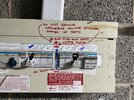What’s the difference though really?
A bit of masking tape I can pull off or a blanking plate I can err….. pull off.
The only ones that fit are the unsecured pull off type and masking tape I already had.
As the only occupant of the house I’ll try and remember not to pull it off, but then again sometimes I forget where I left my pants.
A bit of masking tape I can pull off or a blanking plate I can err….. pull off.
The only ones that fit are the unsecured pull off type and masking tape I already had.
As the only occupant of the house I’ll try and remember not to pull it off, but then again sometimes I forget where I left my pants.


